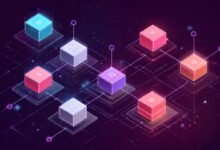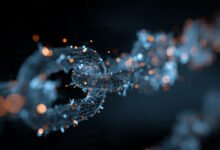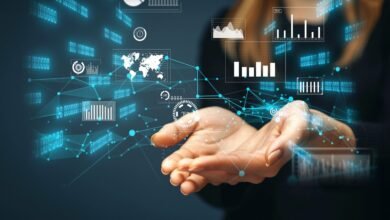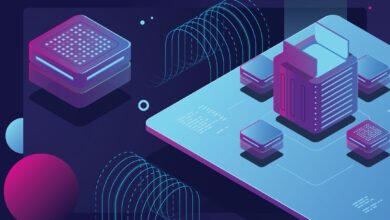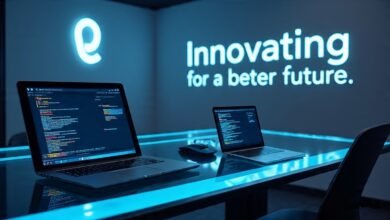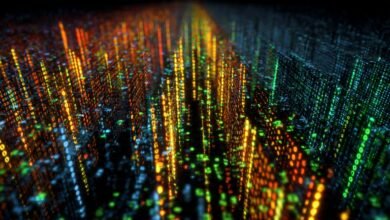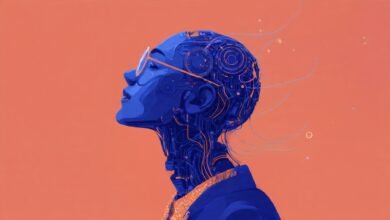Blockchain for AI Decentralized Machine Learning Networks
Discover how blockchain transforms AI through decentralized machine learning networks, enhancing data privacy, security, and collaborative model.

The convergence of blockchain technology and artificial intelligence represents one of the most transformative developments in modern computing. As machine learning models become increasingly sophisticated and data-hungry, traditional centralized approaches face mounting challenges related to data privacy, security vulnerabilities, and monopolistic control by tech giants. Decentralized machine learning networks powered by blockchain for AI offer a revolutionary solution that addresses these critical concerns while unlocking unprecedented opportunities for collaborative innovation.
Blockchain-based AI systems leverage distributed ledger technology to create transparent, secure, and democratized ecosystems where multiple participants can contribute computational resources, share training data, and collectively develop machine learning models without compromising sensitive information. This paradigm shift eliminates single points of failure, enhances data security, and ensures that AI development becomes more accessible and equitable across global communities.
The integration of blockchain and machine learning creates a tamper-proof environment where AI algorithms can access reliable datasets, maintain data provenance, and execute training processes with verifiable integrity. Through smart contracts and cryptographic protocols, these decentralized networks establish trust mechanisms that enable secure collaboration between parties who may not know or trust each other inherently. Organizations ranging from healthcare providers to financial institutions are now exploring federated learning frameworks built on blockchain infrastructure to train sophisticated models while maintaining strict data privacy compliance.
As we navigate 2025 and beyond, decentralized AI platforms are emerging as viable alternatives to centralized cloud-based solutions, offering enhanced scalability, transparency, and user empowerment. From distributed computing networks that aggregate idle processing power to tokenized incentive systems that reward quality data contributions, blockchain is fundamentally reshaping how we approach artificial intelligence development. This comprehensive guide explores the architecture, benefits, challenges, and real-world applications of blockchain for AI, providing insights into how this technology fusion is democratizing machine learning and creating more resilient, trustworthy AI systems for the future.
Blockchain Technology and Its Role in AI
Blockchain technology functions as a distributed ledger that records transactions across multiple nodes, creating an immutable and transparent record of all activities within the network. In the context of AI and machine learning, blockchain serves as the foundational infrastructure that enables decentralized collaboration, ensures data integrity, and provides cryptographic security for sensitive information used in model training.
The Fundamentals of Distributed Ledger Technology
At its core, a blockchain network consists of interconnected nodes that collectively maintain a shared database without requiring a central authority. Each transaction or data update is grouped into blocks, cryptographically linked to previous blocks, and validated through consensus mechanisms before being permanently added to the chain. This architecture provides several critical advantages for machine learning applications, including resistance to data tampering, transparent audit trails, and elimination of single points of failure that plague centralized systems.
How Blockchain Enhances AI Development
The integration of blockchain with artificial intelligence addresses fundamental challenges in modern ML workflows. Traditional centralized AI systems store massive datasets in single repositories, creating attractive targets for cyberattacks and raising significant privacy concerns. Blockchain-powered AI distributes data across multiple nodes, ensuring that no single entity controls the entire dataset. Through cryptographic techniques such as zero-knowledge proofs and homomorphic encryption, participants can contribute to model training without exposing their raw data, maintaining data privacy while enabling collaborative learning.
Smart contracts automate and enforce agreements between participants in decentralized machine learning networks, managing everything from data access permissions to reward distribution for computational contributions. These self-executing contracts ensure transparent operations and reduce the need for intermediaries, lowering costs and accelerating AI development cycles.
Decentralized Machine Learning: A New Paradigm
Decentralized machine learning represents a fundamental departure from traditional centralized approaches, distributing both data and computational tasks across a network of independent nodes. This architectural shift addresses critical limitations of conventional AI systems while introducing new capabilities that were previously impossible in centralized environments.
Federated Learning on Blockchain
Federated learning enables multiple parties to collaboratively train machine learning models without sharing their underlying datasets. In a blockchain-based federated learning system, participating nodes train local models using their proprietary data, then share only the model updates (gradients or parameters) through the blockchain network. A global model emerges from aggregating these updates, with the blockchain ensuring that all contributions are authentic, timestamped, and immutable.
This approach is particularly valuable in industries with strict data privacy requirements, such as healthcare and finance. Medical institutions can collaborate on developing diagnostic AI algorithms without violating patient confidentiality, while banks can improve fraud detection models without exposing sensitive transaction data. The distributed ledger provides an auditable record of all contributions, enabling fair attribution and incentivization of participants.
Distributed Computing Networks for AI Training
Training sophisticated deep learning models requires enormous computational resources that are often concentrated in large data centers operated by tech giants. Decentralized computing networks democratize access to computational power by aggregating underutilized resources from individual devices, creating a distributed supercomputer for AI training. Blockchain technology orchestrates this collaboration, tracking computational contributions, verifying work completion, and distributing rewards through tokenized incentive systems.
Projects like Bittensor and Fetch.ai exemplify this approach, creating marketplaces where computational resource providers and AI developers can transact directly without intermediaries. The blockchain infrastructure ensures transparent pricing, verifiable service delivery, and automatic payment execution through smart contracts, reducing friction in the distributed computing marketplace.
Key Benefits of Blockchain-Powered AI Networks
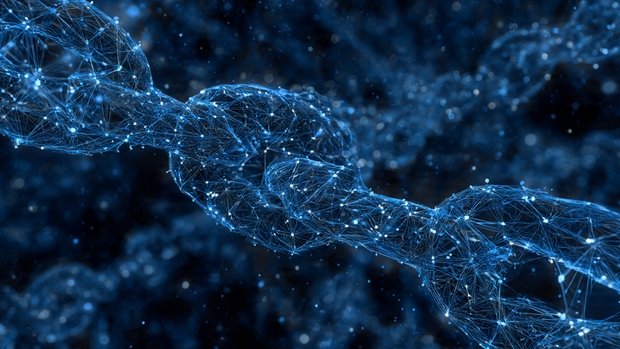
The fusion of blockchain and artificial intelligence delivers transformative advantages that address longstanding challenges in machine learning development while creating entirely new possibilities for innovation and collaboration.
Enhanced Data Privacy and Security
Data privacy stands as one of the most compelling benefits of blockchain for AI. Traditional centralized systems require participants to surrender control of their data to train machine learning models, creating vulnerabilities and trust issues. Decentralized AI platforms enable privacy-preserving computation through techniques such as secure multi-party computation, differential privacy, and encrypted model training.
The immutable ledger provided by blockchain creates a permanent audit trail of all data access and usage, ensuring accountability and enabling regulatory compliance. In sectors governed by strict regulations like GDPR or HIPAA, blockchain-based AI systems provide verifiable proof of consent, data lineage, and proper handling procedures. Cryptographic protections embedded in the blockchain prevent unauthorized access and tampering, while smart contracts automatically enforce data usage policies specified by data owners.
Improved Model Integrity and Transparency
Blockchain technology addresses the “black box” problem in artificial intelligence by creating transparent, auditable records of model development processes. Every training iteration, parameter update, and decision point can be recorded on the distributed ledger, enabling stakeholders to verify model behavior and trace outputs back to their origins. This transparency is crucial for building trust in AI systems, particularly in high-stakes applications like medical diagnosis, financial lending, or criminal justice.
Decentralized Ownership and Democratic AI
Blockchain-powered AI democratizes access to machine learning capabilities by removing barriers imposed by centralized gatekeepers. Individual contributors can participate in AI development regardless of their organizational affiliation, with the blockchain network ensuring fair compensation for their contributions through tokenized reward mechanisms. This model encourages broader participation in AI research, bringing diverse perspectives and datasets into the development process.
Scalability and Resilience
Distributed networks built on blockchain infrastructure exhibit superior scalability compared to traditional centralized systems. As demand for AI services grows, new nodes can join the network organically, expanding computational capacity without requiring centralized infrastructure investments. The decentralized architecture also provides inherent resilience against failures and attacks, as no single node’s compromise can bring down the entire system.
Technical Architecture of Decentralized AI Systems
Building effective decentralized machine learning networks requires careful architectural design that balances performance, security, and usability. The technical infrastructure combines blockchain protocols, distributed computing frameworks, and specialized AI algorithms optimized for decentralized environments.
Blockchain Layer: The Foundation
The blockchain layer provides the trust infrastructure for decentralized AI systems. Various blockchain platforms serve this purpose, each with distinct characteristics. Ethereum and similar smart contract platforms enable programmable coordination of machine learning workflows, while specialized blockchains like Bittensor are purpose-built for AI applications. The choice of blockchain affects transaction throughput, consensus mechanisms, and the complexity of operations that can be performed on-chain.
Consensus Mechanisms for AI Workloads
Traditional blockchain consensus algorithms like Proof of Work or Proof of Stake must be adapted or supplemented for AI-specific requirements. Novel consensus mechanisms, such as Proof of Learning, validate computational work by verifying that participants actually performed legitimate model training rather than simply burning electricity. These mechanisms ensure that network participants contribute meaningful work to AI development while maintaining the security properties of the underlying blockchain.
Data Storage and Management
Storing large training datasets directly on blockchain is impractical due to throughput and cost constraints. Decentralized AI architectures typically use hybrid storage solutions, combining on-chain metadata and access controls with off-chain distributed storage systems like IPFS or Arweave. The blockchain maintains cryptographic hashes and access permissions, while actual data resides in distributed file systems, creating a balance between security and efficiency.
Smart Contract Orchestration
Smart contracts serve as the coordination layer in blockchain-based AI systems, automating workflows from data validation to model aggregation. These contracts manage participant registration, enforce data quality standards, aggregate model updates in federated learning scenarios, and distribute rewards based on contribution metrics. Well-designed smart contracts minimize on-chain computation while ensuring transparent and fair operations.
Privacy-Preserving Technologies
Decentralized machine learning often incorporates advanced cryptographic techniques to enable collaborative training without exposing sensitive data. Homomorphic encryption allows computations on encrypted data, secure multi-party computation enables joint calculations without revealing individual inputs, and differential privacy adds calibrated noise to protect individual data points while maintaining statistical utility. These technologies integrate with the blockchain infrastructure to create privacy-preserving AI systems.
Real-World Applications and Use Cases
Blockchain for AI has moved beyond theoretical concepts to practical implementations across diverse industries, demonstrating tangible benefits in scenarios requiring data privacy, collaborative learning, and decentralized coordination.
Healthcare and Medical Research
The healthcare sector represents one of the most promising domains for decentralized AI. Medical institutions possess vast amounts of patient data but face strict privacy regulations that prevent data sharing. Federated learning on blockchain enables hospitals to collaboratively develop diagnostic AI models for disease detection, treatment optimization, and drug discovery without exchanging sensitive patient records. The blockchain network ensures that all contributions are properly attributed, incentivized, and compliant with healthcare regulations.
Research initiatives using blockchain-powered AI have achieved breakthrough results in rare disease diagnosis by aggregating insights from geographically distributed medical centers that individually lack sufficient data. The immutable ledger provides an audit trail for regulatory bodies while smart contracts automate consent management and data usage limitations specified by patients.
Financial Services and Fraud Detection
Financial institutions leverage decentralized machine learning networks to enhance fraud detection, credit scoring, and risk assessment without sharing proprietary transaction data. Banks can collectively train AI models that benefit from diverse dataset exposure while maintaining competitive confidentiality. Blockchain technology ensures transparent model updates and prevents malicious participants from poisoning the training process with corrupted data.
Distributed AI systems in finance also enable more inclusive credit scoring by incorporating alternative data sources from multiple providers, creating fairer lending decisions while protecting individual privacy through cryptographic protocols. The decentralized architecture reduces systemic risks associated with centralized credit bureaus while improving model accuracy through collaborative learning.
Internet of Things and Smart Cities
IoT networks generate massive data streams from sensors, devices, and infrastructure components. Blockchain-based AI enables secure coordination of these distributed devices, allowing them to collaboratively learn patterns and make intelligent decisions without transmitting all data to centralized cloud servers. Smart city applications use decentralized machine learning for traffic optimization, energy management, and public safety enhancement.
The blockchain infrastructure provides identity management and access control for IoT devices, ensuring that only authorized sensors contribute to AI training and preventing compromised devices from corrupting models. Smart contracts automate data marketplace operations, enabling device owners to monetize their data contributions while maintaining control over privacy settings.
Supply Chain and Logistics
Supply chain management benefits from blockchain-powered AI through enhanced traceability, demand forecasting, and optimization. Machine learning models trained on distributed supply chain data can predict disruptions, optimize routing, and detect counterfeit products while the blockchain ledger maintains transparent records of goods movement and ownership transfers.
Decentralized AI platforms enable competitors within supply chains to collaborate on industry-wide optimization without revealing sensitive business information, improving efficiency for entire ecosystems rather than individual participants. The combination of blockchain and artificial intelligence creates trust mechanisms that facilitate coordination between parties with competing interests.
Challenges and Limitations
Despite significant promise, blockchain for AI faces substantial technical, economic, and regulatory challenges that must be addressed for widespread adoption.
Scalability Constraints
Blockchain networks typically process far fewer transactions per second than centralized databases, creating bottlenecks for machine learning applications that require frequent parameter updates or large data transfers. Training complex deep learning models in fully decentralized environments remains computationally expensive and time-consuming compared to centralized alternatives. Ongoing research into layer-2 scaling solutions, sharding, and optimized consensus mechanisms aims to address these limitations.
Computational Overhead
The cryptographic operations, consensus protocols, and redundant verification inherent in blockchain technology introduce significant computational overhead. Privacy-preserving techniques like homomorphic encryption and secure multi-party computation can increase AI training costs by orders of magnitude compared to plaintext computation. Balancing security, privacy, and performance requires careful architectural decisions and ongoing optimization.
Incentive Alignment and Governance
Creating effective incentive mechanisms in decentralized AI networks presents complex economic challenges. Rewarding computational contributions fairly while preventing gaming of reward systems requires sophisticated tokenomics design. Governance of blockchain-based AI projects must balance decentralization with efficient decision-making, addressing questions about model updates, protocol changes, and dispute resolution.
Data Quality and Adversarial Attacks
Distributed machine learning systems face unique security challenges, including poisoning attacks where malicious participants contribute corrupted data or model updates to degrade performance. Byzantine actors may attempt to manipulate federated learning processes or extract sensitive information through gradient analysis. Robust detection mechanisms and Byzantine-fault-tolerant algorithms are essential for maintaining AI model integrity in adversarial environments.
Regulatory Uncertainty
The regulatory landscape for blockchain and AI remains fragmented and evolving. Questions about data sovereignty, cross-border data transfers, algorithmic accountability, and liability in decentralized systems lack clear answers in many jurisdictions. Compliance with existing frameworks like GDPR while leveraging blockchain’s immutability creates technical and legal tensions that require innovative solutions.
Leading Platforms and Projects
The decentralized AI ecosystem includes numerous platforms and protocols, each approaching the integration of blockchain and machine learning from different angles.
SingularityNET
SingularityNET operates a decentralized marketplace for AI services, enabling developers to publish and monetize machine learning algorithms while users discover and purchase AI capabilities. The blockchain infrastructure facilitates transparent transactions and ensures service providers deliver promised functionality. This platform democratizes access to AI technology by removing centralized gatekeepers and enabling direct peer-to-peer interactions.
Fetch.ai
Fetch.ai combines blockchain technology with autonomous economic agents that use machine learning to perform tasks and negotiate on behalf of their owners. The platform targets applications in smart cities, supply chains, and decentralized finance, where intelligent agents can optimize resource allocation and coordinate complex activities. The distributed ledger maintains transaction records and enables trustless coordination between independent agents.
Ocean Protocol
Ocean Protocol creates a decentralized data marketplace where data providers can monetize datasets while maintaining control over access and usage. Blockchain-based access controls and smart contracts enforce data sharing agreements, while AI developers can discover and purchase training data from diverse sources. This infrastructure addresses data scarcity challenges in machine learning by creating liquid markets for high-quality datasets.
Bittensor
Bittensor implements a decentralized neural network where nodes contribute computational resources to train machine learning models and receive rewards based on the quality of their contributions. The platform uses a novel consensus mechanism that validates actual learning work rather than arbitrary computation, creating an incentive-aligned ecosystem for collaborative AI development.
Future Trends and Developments

The intersection of blockchain and artificial intelligence continues evolving rapidly, with several emerging trends likely to shape the future of decentralized machine learning networks.
Integration with Edge Computing
Decentralized AI increasingly leverages edge computing infrastructure, training models directly on distributed devices rather than aggregating data in centralized locations. Blockchain protocols coordinate these edge networks, managing model synchronization and ensuring that contributions from resource-constrained devices are properly validated and incorporated. This trend enhances privacy and reduces latency for real-time AI applications.
Emergence of AI-Specific Blockchains
Purpose-built blockchain platforms optimized for AI workloads are emerging, featuring consensus mechanisms that validate machine learning computations, data structures optimized for model parameters, and native support for privacy-preserving techniques. These specialized blockchains overcome limitations of general-purpose platforms, enabling more efficient decentralized AI development.
Tokenization and AI Model Marketplaces
The tokenization of AI models creates new economic models where creators can fractionally own and monetize their intellectual property. Blockchain-based marketplaces enable trading of model weights, attention mechanisms, and specialized components, accelerating innovation through composability. Smart contracts automatically distribute revenue based on model usage and contribution provenance.
Integration with Zero-Knowledge Proofs
Zero-knowledge proofs enable AI systems to verify model integrity and computational correctness without revealing underlying data or parameters. This technology combines with blockchain infrastructure to create verifiable machine learning, where users can trust model outputs without accessing training data or implementation details. Applications range from verifiable fraud detection to privacy-preserving authentication systems.
Cross-Chain AI Collaboration
Interoperability protocols enable decentralized AI platforms on different blockchains to share models, datasets, and computational resources. Cross-chain bridges and layer-2 solutions create unified ecosystems where developers can leverage capabilities from multiple blockchain networks, accelerating innovation and preventing fragmentation in the decentralized AI landscape.
Implementation Considerations for Organizations
Organizations considering blockchain for AI implementations must carefully evaluate technical requirements, organizational readiness, and strategic alignment.
Assessing Use Case Suitability
Not all AI applications benefit equally from decentralization. Organizations should prioritize use cases where data privacy, multi-party collaboration, or transparency provides substantial value. Applications involving sensitive data from multiple sources, regulatory compliance requirements, or a need for auditable AI decisions represent strong candidates for blockchain-based solutions.
Technology Stack Selection
Choosing appropriate blockchain platforms, consensus mechanisms, and machine learning frameworks requires tradeoffs between decentralization, performance, and developer ecosystem maturity. Organizations must evaluate whether existing platforms meet their requirements or whether custom development is necessary. Integration with legacy systems and existing AI infrastructure should be carefully planned.
Talent and Expertise Requirements
Successful implementation requires teams with expertise spanning blockchain development, machine learning engineering, cryptography, and distributed systems. Organizations should invest in training existing staff or recruiting specialists familiar with decentralized AI architectures. Partnerships with specialized consultants or platform providers can accelerate deployment.
Security and Compliance Framework
Blockchain-based AI systems introduce novel security considerations alongside traditional machine learning vulnerabilities. Organizations must establish comprehensive security frameworks addressing smart contract vulnerabilities, cryptographic key management, adversarial machine learning, and compliance with data protection regulations. Regular security audits and penetration testing should be incorporated into development lifecycles.
More Read: How AI and Blockchain Technology Work Together
Conclusion
Blockchain for AI represents a transformative convergence that addresses critical challenges in modern machine learning while creating unprecedented opportunities for collaborative innovation. By leveraging distributed ledger technology, decentralized machine learning networks enhance data privacy, eliminate single points of failure, democratize access to AI capabilities, and establish transparent, auditable systems that build stakeholder trust. From healthcare institutions collaborating on diagnostic models without compromising patient confidentiality to financial institutions collectively combating fraud while maintaining competitive advantages, real-world applications demonstrate tangible benefits across diverse sectors.
While challenges related to scalability, computational overhead, and regulatory uncertainty remain, ongoing technological advancements and maturing ecosystems continue addressing these limitations. As we progress through 2025 and beyond, the integration of blockchain and artificial intelligence will increasingly define how organizations develop, deploy, and govern AI systems, creating more equitable, secure, and resilient foundations for the next generation of intelligent applications that serve broader societal interests rather than concentrated corporate control.
